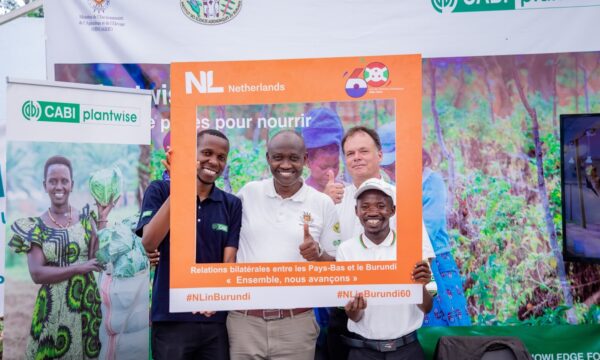For 350 international delegates and observers attending this week’s annual meeting of the Commission on Phytosanitary Measures (CPM), standards will be adopted on plant protection with far-reaching implications on livelihoods, food security and ecosystems back at home. Plantwise, a development cooperation programme led by CABI which works to improve livelihoods in 31 countries, convened representatives of national governments and international organisations on Thursday to address the impact of improved pest advice, and pest tracking, for the small-holder farmer. At the CPM side session representatives of the World Trade Organization, the International Seed Federation and Contracting Parties of the International Plant Protection Convention (IPPC) discussed how Plantwise can support the National Plant Protection Organisations (NPPO) and contribute to the mission of the IPPC.
Currently, pests destroy 40% of crops worldwide before they can be harvested. Just 1% decrease in this loss could feed millions and curb global poverty. Through Plantwise and its 127 national partners, over 280,000 farmers can access crucial diagnostic advice to identify and treat pests by visiting local plant clinics supported by a global online knowledge bank. On hand to share their experiences of implementing Plantwise in their home countries were IPPC contact points from Tanzania, Nepal and Sierra Leone. “The problem is diagnostics,” says Dr. Shamie, Director of Crops in Sierra Leone and IPPC contact. “To properly record and treat pests, farmers need to see them. The plant clinics make it easy to know what the problem is and get help.” Tanzania representative Cornelius Fabian Mkondo mentioned the plant clinics as one part of the plant health system that’s changing incidents of crop loss. “When we received the new pest surveillance report on Maize Lethal Necrosis, for example, we wanted to talk to farmers about what they should do, and we use the Plantwise approach for action.” In November last year, a plant health rally was held in Northern Tanzania to warn farmers before this eminent threat arrived. Tracking pest problems, especially new pests, is critical to the work of IPPC, whose mission is to protect agriculture and the environment by limiting the spread of plant pests. “What the farmers and extension officers do can affect us badly. If a pest is found without reporting, this can be a real concern,” says David Nowell, Senior Information Exchange Officer of IPPC. “We need to talk to each other,” says Nowell. Farmers are not only given advice at plant clinics, pest reporting data is collected from their visits and made accessible to global and national regulators through the knowledge bank, to inform the fight against pests at all levels. In the future CABI/Plantwise and IPPC need to work together to ensure that the occurrence of pests is actively communicated to the national regulators. For its part, IPPC has announced new online resources to open up information exchange, which Plantwise and CABI will collaborate on, helping to bridge the gap between discussions in Rome and the daily needs of agricultural and environmental sector workers worldwide. Knowledge sharing between the 61 year-old IPPC and 103 year-old international not-for-profit science-based development organisation CABI marks the start of an expanded relationship to facilitate trade, environmental protection and global food security. In addition to speakers at the meeting, representatives of almost half the countries where Plantwise operates were in attendance to share experiences and regional perspectives on pest management and food security. “This is the missing link between farmers and experts. Plantwise is one area where everyone is brought together,” says Yubak Dhoj of Nepal. Download full presentations here
View presentations online here:
[slideshare id=20264198&sc=no]
Related News & Blogs
How plant clinics are strengthening crop health services in Bangladesh
When the first-ever plant clinic in Bangladesh opened in Dhaka in 2013, it initially faced a lack of interest due to its novelty and limited awareness among farmers. However, it went on to expand, providing advice to over 17,000 farmers and led to the…
2 July 2025







